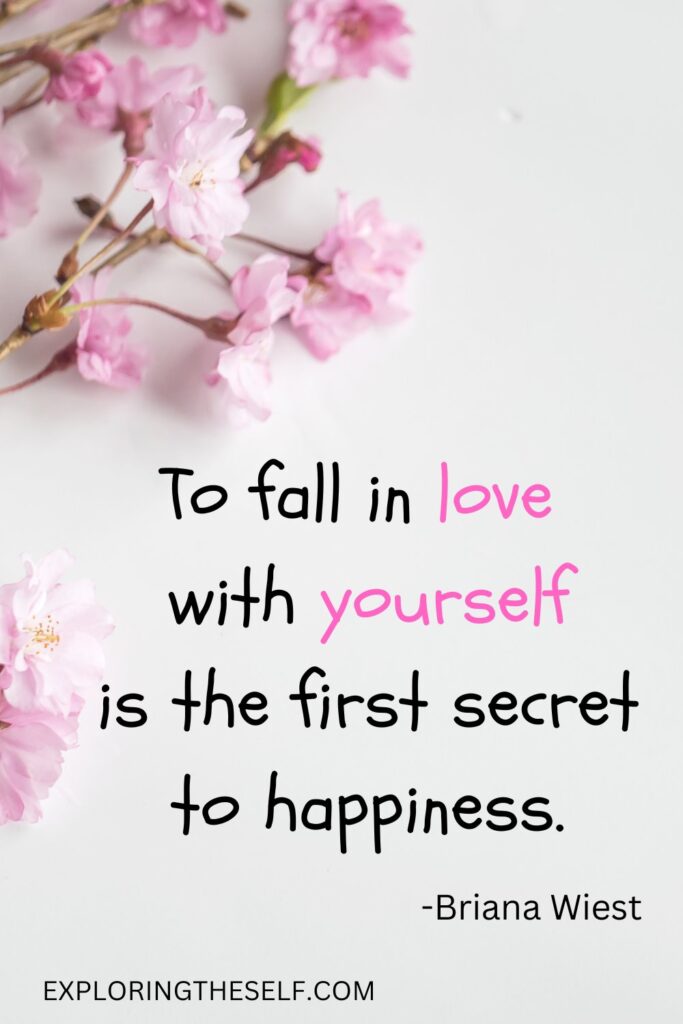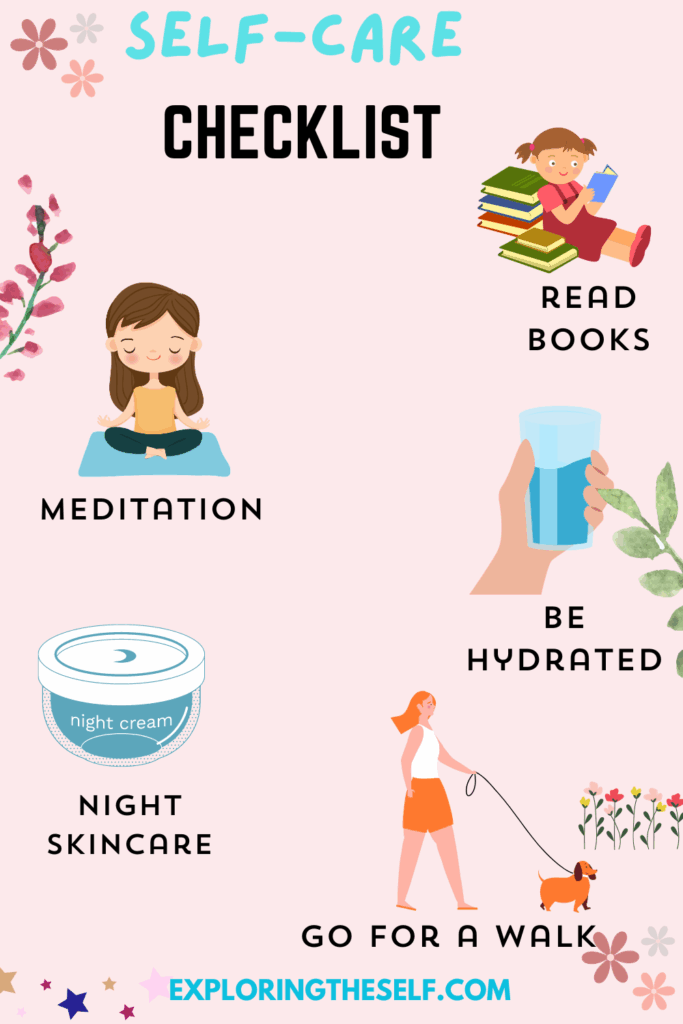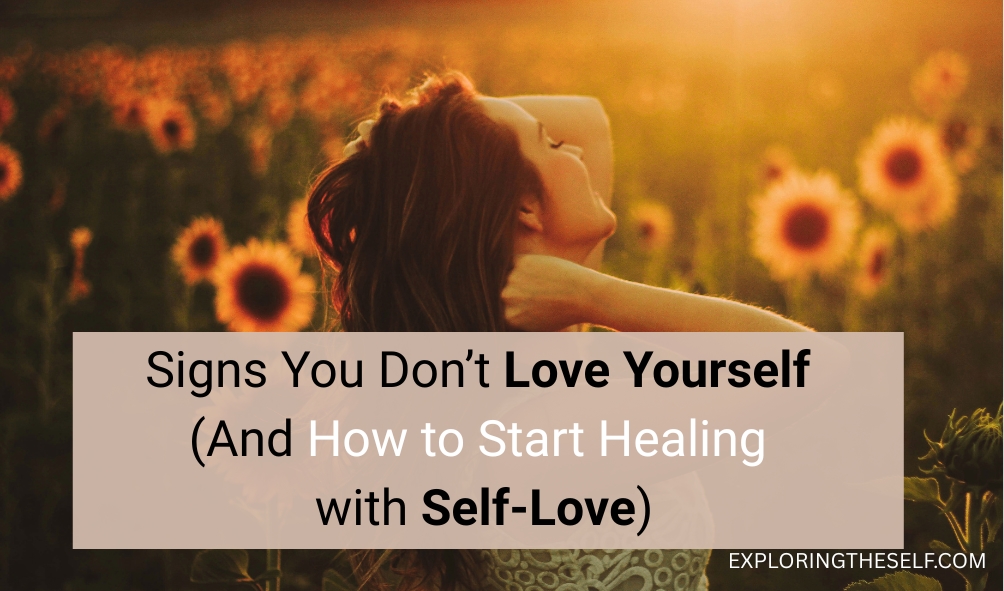Have you ever wondered what if the person you neglect the most… Is You? Yes, you! Got shocked!
You might be looking into the mirror and babbling, “Oh! I’m not good enough,” “I always mess up things.”Or maybe you constantly put others first, even when it drains you completely?
If so, you might be struggling with something deeper. Something many of us silently battle – “Not knowing how to love yourself.”
Don’t worry, you’re not alone.
Learning to love yourself is no longer an option. It has become a necessity, as many of us struggle to embrace our worth. Low self-esteem lowers resilience and our overall well-being, leaving us stuck with self-critical thoughts.
I must tell you, Self-love isn’t just about fancy bubble baths and positive affirmations (although those help).
“It’s about how you treat yourself when no one’s really watching.
It’s about how you speak to yourself when you fail hard,
how you nourish your needs, and how you set boundaries.”
In this post, I’ll share how to know if you really lack self-love and the subtle signs that you may have been neglecting. I’ll also tell you how to start learning to love yourself again with proven methods. Excited!
So, if you’re new to the journey of self-exploration or you’ve been practicing self-care for years, you’ll find this post informative & useful.
Are you ready to take actionable steps to deepen your relationship with yourself? Let’s dive in!
Table of Contents
How To Recognize If You Lack Self-Love
Understanding Self-Love vs. Self-Neglect
Before diving into the signs, let’s clarify what self-love really means. And contrast it with its opposite to have a better understanding.
Self-love is treating yourself with the same kindness, tenderness, and respect you’d offer a good friend. Self-neglect, by contrast, is a pattern of ignoring and dismissing your own needs, feelings, and boundaries.
Let’s break them down.
| Self-Love | Self-Neglect |
|---|---|
| Positive self-talk (“I deserve love & happiness.”) | Persistent self-criticism (“I’m so stupid.”) |
| Setting healthy boundaries in relationships | Always pleasing people at the expense of your own needs |
| Prioritizing self-care rituals | Ignoring basic needs like sleep, nutrition, or rest |
| Embracing imperfections as part of growth ( “It’s okay to make mistakes.”) | Obsessing over flaws and holding past failures (“Why I often mess up things.”) |
| Seeking support when overwhelmed | Rejecting friends, family, or professional help |
| Acknowledging your accomplishments | Discounting successes, attributing them to luck |
| Practicing gratitude daily | Focusing on negatives or “what ifs” |
| Celebrating small wins | Constantly chasing bigger goals, never pausing to reflect and cherish |
Save it for later
Key Signs You Don’t Love Yourself Enough
Life is too short to be bothered about – what others think, isn’t it? You must remember that “If we don’t love ourselves enough, no one would.”
So, on that note, I’ve compiled a list of 9 subtle signs you don’t love yourself enough. Let’s explore each sign in depth. These will help you clarify whether you truly love yourself and cherish who you are.
Let’s get started!
1. You are Self‑Critical, only seeing your flaws
You only focus on your mistakes and faults. And believe that you can’t do anything right. Well, You’re being self-critical.
What it looks like:
- A constantly running inner monologue that scolds you over small mistakes.
- Self-talk characterized by words like “failure,” “worthless,” or “stupid.”
Why it matters:
Persistent self-criticism fuels shame, heightens anxiety, and decreases your ability to bounce back from setbacks (Good Men Project on Self-Criticism). Instead of learning from missteps, you internalize them as proof of your inadequacy.
If you love yourself, you accept that – “OK, I’ve flaws and I know I can work on them.”
How to notice it:
- Write down recurring negative thoughts over a week.
- Notice the tone: Is it compassionate or harsh?
2. Fear of Vulnerability
You are overly worried about what others think.
What it looks like:
- Avoiding deep conversations or deflecting when someone asks, “How are you, really?”
- Having only surface-level interactions to avoid judgment and rejection.
Why it matters:
When you lack self-love, people’s opinions are everything to you. Shielding yourself from fear prevents intimacy, reinforces loneliness and finally destroys your sense of belonging.
How to notice it:
- Track moments you change the subject when things get personal.
- Reflect on whether you’ve shared joys and struggles equally with others.
3. You are busy with People-Pleasing
When you are unaware of your own worth, you get busy making others happy because you just can’t say ‘NO’. I know it’s kind of relatable to you. People who don’t love themselves rely on others for their happiness.

What it looks like:
- Saying yes to favors despite your packed schedule of priorities.
- Feeling guilty at the thought of disappointing someone.
Why it matters:
People-pleasing tendencies harm self-respect and signal your subconscious that your needs are secondary. Over time, it leads to resentment and burnout.
How to notice it:
- List recent “yeses” you regret.
- Rate how comfortable you feel saying “no” on a scale of 1–10.
4. You do Constant Comparison to Others
You compare yourself unfavorably to others every now & then and look for people who are smarter, nicer, intelligent, don’t you?
What it looks like:
- Scrolling social media and feeling envy and despair.
- Believing others’ lives, looks, or careers are always “better.”
Why it matters:
Comparison fuels the belief that you aren’t good enough. Instead of celebrating growth, you chase impossible ideals.
How to notice it:
- Log feelings after social media; note spikes in negative mood.
- Try a digital detox day and observe the change.
5. Neglecting Your Basic Needs
Another sign that you don’t love yourself is that you don’t take care of yourself enough.
What it looks like:
- Regularly skipping meals, sleep, or exercise.
- Postponing doctor’s appointments or personal downtime.
Why it matters:
Your body and mind rely on consistent care to function optimally. You develop self-destructive behaviors while neglecting your basic needs.
How to notice it:
- Track your sleep and meal patterns for a week.
- Identify moments you prioritize work or others over your rest.
6. Having Difficulty In Accepting Compliments
You think that you don’t deserve to be praised by others. And you feel so lowly about yourself that compliments sound fake.
What it looks like:
- Rejecting praise with “It was nothing” or “Anyone could have done it.”
- Feeling uncomfortable or anxious when acknowledged.
Why it matters:
Accepting compliments allows you to give yourself positive feedback. You feel good about yourself and your ability. It’s a pat on the back – “OK, you are doing great in life, keep it up.”

How to notice it:
- Recall the last time you received a genuine compliment.
- Note down your immediate reaction—did you accept or deflect?
7. You are Caught Up In Sabotaging Relationships & Opportunities
When you lack self-love, you often struggle in relationships. It’s so obvious that you end up pushing people away.
What it looks like:
- Pushing away supportive friends or ending promising relationships out of fear.
- Procrastinating on important tasks until deadlines loom.
Why it matters:
Self-sabotage is a product of self-hatred, low confidence and negative beliefs (“I’ll never succeed, so why try?”). It keeps you trapped in a cycle of disappointment.
How to notice it:
- Journal moments when you felt you “didn’t deserve” success or love.
- Identify recurring patterns of avoidance or last‑minute rushes.
8. You are Circling in the Loop of Guilt & Shame
You feel ashamed of yourself and are often embarrassed that you want to hide. This is a clear sign of not loving & accepting yourself.
What it looks like:
- Obsessing over past mistakes long after they’ve passed.
- Feeling a core sense of “badness” regardless of your actions.
Why it matters:
Guilt and shame destroy self-esteem and worth. While guilt can motivate change, shame convinces you that you are flawed. That something is wrong.
How to notice it:
- Pay attention when you replay scenarios—are you focused on actions (guilt) or identity (shame)?
- Use journaling to separate “I did something wrong” from “I am wrong.”
9. You aren’t Comfortable with Self‑Reflection
You avoid introspection and soul searching because you don’t have the confidence to see your inner self.
What it looks like:
- Drowning yourself in busyness—work, TV, social media—to dodge inner thoughts.
- Feeling anxious about spending time alone with your mind.
Why it matters:
Self-reflection is the way towards growth. By avoiding it, you deny yourself the chance to learn about your true inner beauty, needs, values, and desires.
How to notice it:
- Observe your habits—are they distracting or restorative?
- Try a brief silent meditation and gauge your comfort level.
What Psychology and Research Say about These Signs
Modern psychology provides us with some evidence on why these signs emerge and how to counteract them:
- Self-Compassion: Kristin Neff’s pioneering studies show that self-talk with compassion reduces cortisol, improves emotional regulation, and fosters resilience.
- Cognitive Behavioral Therapy (CBT): CBT techniques help in reframing distorted thoughts by challenging evidence and testing beliefs. This is effective for reducing depression and anxiety symptoms (Beck et al., 1979).
- Compassion-Focused Therapy (CFT): CFT includes evolutionary psychology, neuroscience, and theory to cultivate warmth and self-soothing systems in the brain (Gilbert, 2009).
- Inner Child Work: It is emerging as a popular term nowadays on social media for healing. Inner child work techniques encourage treating your past self with empathy, leading to improved self-regulation and emotional safety (The Guardian on Inner Child Work).
My Journey from Self‑Neglect to Self‑Love
A few years back, I was locked in a loop of late‑night regrets, replaying mistakes, and feeling paralyzed by “What ifs?” I blamed myself for every wrong thing that unexpectedly happened in life. This continued for a really long time, and the result?
I became my own enemy. My mental health suffered. I could no more see worth in myself.
I remember while scrolling on my phone at 2 a.m., I stumbled upon a video by a therapist discussing shadow work—a journaling practice that invites you to explore repressed emotions. The next day, on a whim, I grabbed a notebook. And write it all out! It was hard, but I did.
I wrote down every negative thought I had about myself. I traced some of the thoughts of childhood moments—parents’ high expectations, taunts of people. Then, I drafted an apology letter to my younger self, offering forgiveness and compassion. I just can’t tell you how relieved I felt that day.
With time, I noticed changes with fewer late‑night worries. I started gaining clarity.
Over months, that simple practice unlocked a series of changes: I started prioritizing myself, scheduling coffee dates with supportive friends, and even signing up for a music class—something my younger self would have been too scared to try.
Today, I’m far from “complete”—self-love is ongoing—but I now hear a kinder voice inside. That some days are harder than others, but it’s okay. Having my ‘SELF’ on my side, I can win any battle.
How to Start Healing and Learn to Love Yourself
Loving yourself means accepting all of yourself to the core- your strengths, weaknesses, fears, everything. Below are the 8 ways you can start loving yourself if you really lack self-love in life.

1. Cultivating Mindful Self‑Compassion
Self-compassion is a positive attitude we have towards ourselves by being tolerant of our temper.
- How to Practice: Commit to a 5‑minute daily mindful meditation mainly focused on self-kindness and forgiveness. Use apps like Insight Timer or exercises from Kristin Neff’s website.
- Why it works: Self-compassion practice rewires neural pathways, reducing the impact of self-criticism and activating caregiving signals in the brain. Its effectiveness was studied by Neff & Germer (2013).
2. Start Journaling & Shadow Work
When you start writing down your thoughts, you build a healthy relationship with yourself.
- How to Practice: Set aside 10–15 minutes each morning to journaling and responding to prompts like:
- “What beliefs about myself are holding me back?”
- “What are the things I love about myself?”
- Why it works: Externalizing thoughts makes you aware of your strengths and reframing your abilities. them tangible, enabling critical distance and reframing.
3. Learn To Set Healthy Boundaries
Feel free to say ‘NO’ and learn to set boundaries with those who don’t respect you and always make you feel cheap & worthless.
- How to Practice: Start giving yourself importance. Identify one relationship or situation where you feel uncomfortable. Draft a clear “I” statement (e.g., “I need an hour of quietness to recharge”).
- Why it works: Setting healthy boundaries builds self-worth, reduces resentment, and preserves emotional energy.
4. Engaging More in Regular Self‑Care Rituals
Well, I don’t need to say much about how engaging in self-care rituals is vital in the journey of loving yourself and healing.

- How to Practice: Design a weekly self-care planner:
- Physical: 30-minute walks, restorative yoga.
- Emotional: Journaling, talking with a trusted friend, dating yourself.
- Creative: Painting, playing music, cooking a new recipe, going to a spa.
- Why it works: Self-care rituals make you feel great and happy without someone. This builds trust in yourself.
5. Practice Gratitude And Cherish Small Things
Practicing gratitude makes you realize how thankful and lucky you are in life. You have everything you need – “a roof over your head, food to eat, bed to sleep on & internet to reach this post”:
- How to Practice: Keep a Gratitude journal—each night, jot down three positive experiences and your role in them.
- Why it works: Gratitude points your attention toward positives, counteracting negativity bias and boosting well‑being (Emmons & McCullough, 2003).
6. Pursue your Interest
- How to Do: Join classes for hobbies you want to learn (e.g., playing piano, art, learning a language, fitness).
- Why it works: By pursuing passions, you will build yourself a better person with a bright future.
7. Seek Help If You Need
- You can always reach out for help from a professional if you’re really out of love. It’s completely okay. Therapy isn’t just for when you’re “broken.” It’s a space to understand your side of the story, build emotional skills, and rewire how you treat yourself.
Some More Helpful Resources
- 12 Effective Self-Care Ideas For When You’re Feeling Low and Unmotivated
- 21 Best Self-Love Quotes To Remind You To Love Yourself
Conclusion
Learning to love yourself is an evolving journey, marked by self-discovery, challenges, and triumph. By spotting the signs of self-neglect—ranging from being self-critical to circling in the loop of shame & guilt, you can cultivate a kinder, more supportive relationship with yourself.
I hope this post on signs you don’t love yourself and how to embrace self-love was a bit useful to you. Comment below with one sign you recognized in yourself. If possible, share this post to help others start their self-love journey.
Remember, you have to love yourself because you’re special.✨ You are worthy today and every day.
With Love❤️


